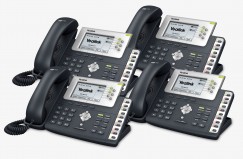10 Reasons to Switch to an IP-PBX
What is an IP-PBX?
An IP-PBX is a complete telephony system that provides telephone calls over IP data networks. All conversations are sent as data packets over the network.
The technology includes advanced communication features but also provides a significant dose of worry-free scalability and robustness. The IP-PBX is also able to connect to traditional PSTN lines via an optional gateway – so upgrading day-to-day business communication to this most advanced voice and data network is a breeze!
Enterprises don’t need to disrupt their current external communication infrastructure and operations. With an IP-PBX deployed, an enterprise can even keep its regular telephone numbers. This way, the IP-PBX switches local calls over the data network inside the enterprise and allows all users to share the same external phone lines.
How it works
Figure 1 – How an IP-PBX integrates into the network
An IP-PBX or IP Telephone System consists of one or more SIP phones, an IP-PBX server and optionally a VoIP Gateway to connect to existing PSTN lines. The IP-PBX server functions in a similar manner to a proxy server. SIP clients, being either soft phones or desk phones, register with the IP-PBX server, and when they wish to make a call they ask the IP-PBX to establish the connection. The IP-PBX has a directory of all phones/users and their corresponding SIP address and thus is able to connect an internal call or route an external call via either a VoIP gateway or a VoIP service provider. More information and commonly asked questioned about IP-PBXs can be found on IP-PBX, SIP & VoIP FAQ.

